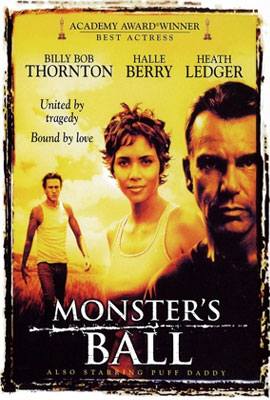
(2002)
directed by Marc Forster
“Thou shalt not kill.” Has there ever been a clearer directive? In his story “The Hanging,” George Orwell describes his traumatic experience participating in the capital punishment of a Hindu man, “We were waiting outside the condemned cells, a row of sheds fronted with double bars like animal cages.” He then notes how it took six guards to transport a weak and tired man. As they are walking from the prison courtyards to the gallows, Orwell notices how the Hindu man steps around a puddle despite being tightly gripped by the guards.
Orwell feels deep remorse as he comes to the realization that the condemned man is perfectly alive, “I had never realized what it means to destroy a healthy, conscious man.” When they reach the gallows and the prisoner has a noose around his neck, Orwell shares his thoughts at that moment, “Everyone had changed color, the same thought was in all our minds, oh, kill him quickly, get it over with!”
“Monster’s Ball” is an extraordinary film about a man and woman who find solace for their loss and pain in each other. The title of the film is an old English term for a party thrown in jail for a condemned man before he is executed. The man awaiting execution is Lawrence Musgrove, a black man who has been on Death Row in a Georgia penitentiary for many years. The nature of his crime is never revealed. “I’m a bad man,” he tells his young son, “You’re the best of me.”
Hank and Leticia live in a small Georgia town. Leticia (Halle Berry) works the night shift at a diner and has an ex-husband, Lawrence Musgrove, who is on Death Row. Hank (Billy Bob Thornton) works as a prison guard on Death Row, has a racist father and a sensitive son, and is involved in Leticia’s ex-husband’s execution. At first, Hank and Leticia do not realize the connection they have through the condemned man.
Hank shares a household with his father and his son. Hank’s father, Buck, a retired prison guard, is confined to a wheelchair yet still has a powerful presence in the family. Hank is both an abused son and an abusive father. Heath Ledger, in one of his most moving screen performances, makes a brief appearance as Sonny, the son that Hank despises. Sonny works at the prison with his father. ‘‘You’ve always hated me, haven’t you,’’ demands Sonny. ‘‘Yes, I have,’’ is Hank’s reply.
Sonny incurs Hank’s wrath by showing inexcusable weakness during Musgrove’s walk to the electric chair. As one of his African-American colleagues tries to pull him off his son, Hank explodes in an obscene rant. “This is not you, Hank,” his colleague insists, trying to calm him down. “This is me,” Hank screams. “This is me.” Later, in a jolting, shocking scene, the humiliated Sonny kills himself in front of his father and grandfather. After Sonny’s death, Hank leaves the prison service and buys a gas station.
Leticia drinks too much, uses shame as her preferred parenting method, and has been served with an eviction notice. As if it weren’t enough for Leticia’s husband to die in the electric chair, her young son is killed by a hit-and-run driver while walking alongside a busy highway with his mother. Hank stops to help after the hit-and-run accident, drives Leticia’s injured son to the hospital, and tries to comfort Leticia.
Hank and Leticia start spending time together. “Make me feel good!” she says to Hank. They find solace for their loss and pain in each other’s company. The poignant “Monster’s Ball” is one of those rare movies that makes us feel like we are witnessing actual events. The raw intimacy of some of the scenes is overwhelming. Halle Berry received a richly deserved Academy Award for Best Actress for her performance in “Monster’s Ball.”